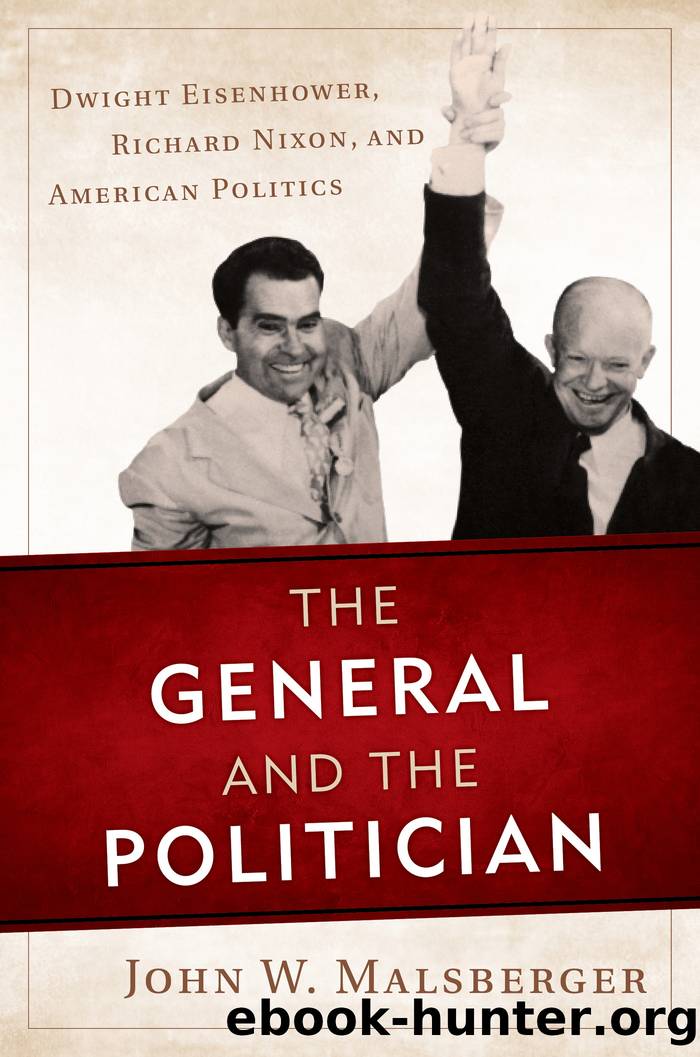JFK and His Enemies by Thomas J. Whalen

Author:Thomas J. Whalen
Language: eng
Format: epub
Tags: undefined
Publisher: Rowman & Littlefield Publishers
Published: 2012-01-15T00:00:00+00:00
On Monday, November 27, 1957, President Eisenhower returned to the White House after greeting the king of Morocco, who had arrived for a state visit. He began to attend to some paperwork but felt strangely dizzy and had difficulty reading printed words. He summoned his secretary, Ann Whitman, but found to his great frustration that his words came out as gibberish. Physicians soon diagnosed his problem: The president had suffered a slight stroke. Although Eisenhower would experience occasional difficulty choosing the right word for the rest of his life, he recovered quickly and was back to his normal routine within a few days.[55]
But for the sixty-seven-year-old president, who had within the past two years suffered a heart attack and undergone serious surgery for ileitis, this latest health problem seemed to concentrate his attention more firmly on his legacy. How could his middle way be protected from the backward-looking Old Guard conservatives or the wild-spending Democrats if he died in office or after he left the White House in 1960? How would his efforts to modernize the Republican Party be continued in his absence?
Eisenhower seemed to disclose his answer to those questions in a remarkable âPersonal and Secretâ letter to the vice president on February 5, 1958. In it Ike spelled out the substance of the arrangement he had reached with Dick about the transfer of power should he be incapacitated. If the president recognized that he was unable to discharge his duties, he would notify Nixon, who would take over as acting president. In all other cases, especially if the president was unaware of his incapacity, Nixon would be the one âexplicitly and exclusivelyâ in charge of determining whether the president was unable to perform his duties, as well as âthe exact timingâ of when he would assume the chief executive powers. To ensure that his incapacity would not set off a power struggle within the administration, Eisenhower added, âthis agreement recognizing your clear and exclusive responsibility . . . will remove any necessity or desire on the part of friends and staffs to impede the right and authority of the Vice President in reaching his decision on this matter.â[56] The letter was, in part, vintage Eisenhower. He understood that as president he had a duty to provide for a smooth transition of power in the event of disability. But the letter was also a strong expression of the trust and faith he had developed in his political partner.
Eisenhower had voiced doubts about Nixonâs maturity and judgment during their first term, never putting him at the top of his list of potential successors. Even after his heart attack, Eisenhower did not draw up a detailed process for transferring power to the vice president. But by the time of his stroke in late November 1957, Ike and Dick had worked together closely for five years. In that time Dickâs willingness to serve the administration loyally in a variety of delicate political and diplomatic tasks had impressed Ike favorably. Perhaps more importantly,
Download
This site does not store any files on its server. We only index and link to content provided by other sites. Please contact the content providers to delete copyright contents if any and email us, we'll remove relevant links or contents immediately.
| U.K. Prime Ministers | U.S. Presidents |
Waking Up in Heaven: A True Story of Brokenness, Heaven, and Life Again by McVea Crystal & Tresniowski Alex(37786)
Empire of the Sikhs by Patwant Singh(23072)
We're Going to Need More Wine by Gabrielle Union(19034)
Hans Sturm: A Soldier's Odyssey on the Eastern Front by Gordon Williamson(18572)
Leonardo da Vinci by Walter Isaacson(13316)
The Radium Girls by Kate Moore(12018)
Tools of Titans by Timothy Ferriss(8365)
Educated by Tara Westover(8045)
How to Be a Bawse: A Guide to Conquering Life by Lilly Singh(7472)
Permanent Record by Edward Snowden(5838)
The Last Black Unicorn by Tiffany Haddish(5629)
The Rise and Fall of Senator Joe McCarthy by James Cross Giblin(5275)
Promise Me, Dad by Joe Biden(5141)
The Wind in My Hair by Masih Alinejad(5091)
A Higher Loyalty: Truth, Lies, and Leadership by James Comey(4954)
The Crown by Robert Lacey(4807)
The Iron Duke by The Iron Duke(4349)
Joan of Arc by Mary Gordon(4100)
Stalin by Stephen Kotkin(3957)
